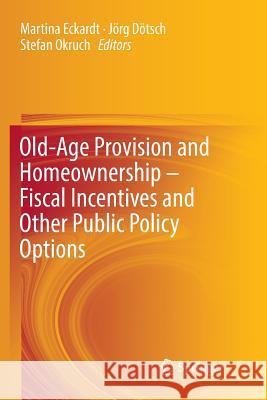Old-Age Provision and Homeownership - Fiscal Incentives and Other Public Policy Options » książka
topmenu
Old-Age Provision and Homeownership - Fiscal Incentives and Other Public Policy Options
ISBN-13: 9783030091712 / Angielski / Miękka / 2018 / 251 str.
Kategorie:
Kategorie BISAC:
Wydawca:
Springer
Język:
Angielski
ISBN-13:
9783030091712
Rok wydania:
2018
Wydanie:
Softcover Repri
Ilość stron:
251
Waga:
0.37 kg
Wymiary:
23.39 x 15.6 x 1.4
Oprawa:
Miękka
Wolumenów:
01
Dodatkowe informacje:
Wydanie ilustrowane











